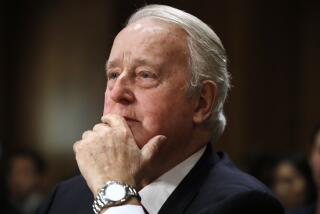Mulroney Urges Unity, Offers Plan on Quebec
- Share via
TORONTO — In a rare televised speech, Prime Minister Brian Mulroney on Thursday urged Canadians to “join together,” and he proposed ways of resolving linguistic and constitutional arguments that have raised the possibility of Quebec splitting off from the rest of Canada.
In an attempt at compromise, Mulroney said he will introduce a new set of constitutional amendments into the Canadian House of Commons next week. His gesture was a tacit admission that another constitutional package that he himself had wanted is unacceptable. The compromise amendments are intended to be added to Mulroney’s original ones, which were crafted in 1987.
Mulroney’s remarks came at a time of growing public uneasiness and frustration in Canada over the political leadership’s inability to agree on what the country stands for and how to embody those principles in law.
Canada has been unable to get all 10 provinces to sign its constitution, as required. Over the last few months, arguments about the constitution have grown so bitter that prominent businessmen and politicians now routinely speculate on what the future would be like without Quebec.
The current discord stems from 1982, when Canada “repatriated” its constitution from Britain. (Before then, its constitution was essentially an act of the British Parliament.) Each of Canada’s 10 provinces was supposed to sign the constitution, but Quebec refused.
To bring Quebec aboard, Mulroney oversaw the drafting of a set of amendments in 1987--a package that has come to be known as the Meech Lake accord, after the Quebec resort where it was discussed.
The Meech Lake amendments were mainly about redistributing economic and political power between the federal government and the provinces. However, they also recognized Quebec as a “distinct society” within Canada. Quebec was satisfied with this. All 10 provinces are required to ratify the accord by June 23.
At first, there was little controversy, but then elections were held. Three newly elected provincial premiers began expressing strong doubts about the accord.
One of the worst sticking points was the clause declaring Quebec a “distinct society.” Quebec had just enacted a law barring the use of any language except French on outdoor signs. That action fueled suspicions that the Meech Lake clause would encourage other divisive acts, such as the province establishing its own foreign policy.
Canada has been mired in this debate for months. Quebec has insisted that the accord be ratified as written, Mulroney has backed Quebec and the three holdout provincial premiers have said they won’t sign unless the accord is modified.
Meanwhile, ordinary Canadians have been steaming over the energy spent on what has appeared to be a hopeless impasse.
By announcing that he would make additions to the Meech Lake accord to get things moving again, Mulroney made a nod toward the dissatisfied English-speaking provinces. But he risked incurring the wrath of Quebec.
The new amendments would still grant Quebec a “distinct society” status, but they would also make the federal government responsible for promoting bilingualism all across Canada. And that would displease Quebec, where French-speakers have argued that their language must be shielded from English if it is to survive.
Mulroney’s new package of amendments was first introduced by New Brunswick Premier Frank McKenna earlier this week. McKenna, who was one of the three holdouts on the Meech Lake accord, told reporters, “It’s time for all of us to spike our guns with flowers.”
But there was no guarantee that Mulroney’s attempt at compromise would take root and grow.
Just hours before the prime minister delivered his address, Newfoundland Premier Clyde Wells, another Meech Lake holdout, moved in his provincial legislature to kill the accord.
More to Read
Sign up for Essential California
The most important California stories and recommendations in your inbox every morning.
You may occasionally receive promotional content from the Los Angeles Times.








